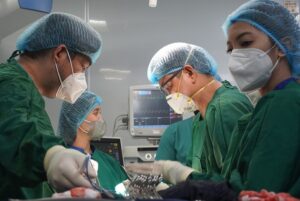 AtriCure has announced that the first patient was treated in the LeAAPS clinical trial, a prospective, randomised clinical trial to evaluate the safety and effectiveness of the AtriClip (Atricure) left atrial appendage (LAA) exclusion system for the prevention of ischaemic stroke or systemic arterial embolism in cardiac surgery patients at elevated risk for these events and with no history of atrial fibrillation (AF).
AtriCure has announced that the first patient was treated in the LeAAPS clinical trial, a prospective, randomised clinical trial to evaluate the safety and effectiveness of the AtriClip (Atricure) left atrial appendage (LAA) exclusion system for the prevention of ischaemic stroke or systemic arterial embolism in cardiac surgery patients at elevated risk for these events and with no history of atrial fibrillation (AF).
The patient was treated by US co-principal investigator Marc Gerdisch at Franciscan St Francis Heart Center in Indianapolis. The trial will enrol up to 6,500 patients at up to 250 centers worldwide, making it the largest randomised clinical trial for surgical LAA exclusion. LeAAPS is intended to inform and better define clinical practice and treatment guidelines for stroke prevention in patients undergoing planned cardiac surgery with an elevated risk of ischaemic stroke and systemic embolism.
“The LeAAPS trial is a landmark study to evaluate the prophylactic use of AtriClip devices for stroke reduction in cardiac surgery patients without a preoperative AF diagnosis, laying the groundwork for a new frontier in stroke prevention,” said Michael Carrel, president and CEO of AtriCure.
AtriCure first entered the LAA market upon US Food and Drug Administration (FDA) 510(k) clearance of the AtriClip System in 2010. AtriCure plans to use LeAAPS trial results to expand the labelled indications for use of the AtriClip system to include stroke prevention in patients with elevated risk of ischaemic stroke events.
The trial will be completed in collaboration with the Population Health Research Institute (PHRI), which is associated with McMaster University in Hamilton, Canada. PHRI is a clinical research organisation that has organised an extensive international network of committed collaborators in 102 countries. PHRI has significant experience and expertise designing and executing large, clinical studies.
“LeAAPS is one the largest randomised controlled trials in cardiac device history, and we expect it will establish a new standard of care for patients undergoing cardiac surgery,” said Richard Whitlock, a cardiothoracic surgeon at McMaster University and the global principal investigator for the trial. “A fantastic multidisciplinary team has designed the trial, and we are all excited to advance the understanding of atrial disease, atrial fibrillation and stroke.”
Whitlock detailed the goals of the trial in a presentation at the 2022 European Association of Cardio-Thoracic Surgery (EACTS) annual meeting (5–8 October, Milan Italy). The study follows on from LAAOS III, in which investigators studied surgical LAAO in patients undergoing valve or coronary artery bypass graft (CABG) surgery with documented atrial fibrillation or atrial flutter and a CHA₂DS₂-VASc score of two or higher, indicating an elevated risk of stroke.













